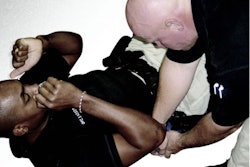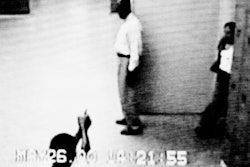An off-duty detective decides to confront a group of rowdy youths in a park near his home and is subsequently beaten to death. An officer checking for a prowler in his neighbor's backyard is shot to death after confronting the trespasser. An officer attending a celebration attempts to break up a fight between two women and is stabbed fatally for his efforts. An unarmed cop shopping with his wife tackles a visibly armed robber who is sticking up the store and is killed by a shotgun blast.
What each of these true-life incidents has in common is that a courageous, well-intentioned American law enforcement officer died violently while attempting to protect others. A fact each also shares is that the victim officer was off-duty when the tragedy occurred.
Because of the kind of people they are, peace officers have a hard time standing by, doing nothing in the face of danger to others. As a result, many times they intervene even though they are acting alone and without many of the advantages they enjoy while "on the clock."
Many times they win the encounter and one more offender is brought to justice. On occasion, however, the scenario takes turns they had not planned and a police funeral is the end result. The question, then, becomes one of when to get directly involved and when to be a very good witness who calls 911.
It is vital to your emotional as well as physical health that you have some down time away from the stresses of the job. Safety-smart officers also make a habit of avoiding clothing that identifies them as law enforcement when they are on their own time. They also avoid places where they are most likely to run into characters that they may have encountered while working. Finally, they remain constantly alert for the unexpected, especially when they are in a public place, just in case a dangerous situation develops around them.
Perhaps most important of all, safety-smart cops size up the opposition they may be facing before they decide to leap into an off-duty confrontation. In order to stay safe, you need to do the same.
Recognize Your Limitations
You do nothing to help a victim and only make the situation worse if you insert yourself into a confrontation you cannot possibly win. To assess your chances of prevailing, you need to examine your potential disadvantages.
Quickly ask yourself some questions. Am I armed? (Going up against an obviously armed adversary without having a gun yourself is suicidal.) Do I have handcuffs? Pepper spray? Taser? Am I wearing body armor? Do I have my law enforcement credentials with me? How about radio communication with on-duty assistance?
Are there additional limitations, such as the presence of your family at the scene, perhaps including youngsters? Are innocent bystanders likely to recognize you and obey your instructions, considering the fact that you're wearing a Bugs Bunny sweatshirt and blue jean cut-offs? The answers you come up with to all of these questions and more should help you decide whether to get directly involved or simply call 911 and continue to assess what you are observing.
You must decide quickly if what you are seeing truly requires law enforcement intervention. As veteran cops will tell you, if you're off-duty, confronting a gang of drunks or gangsters intent on graffiti vandalism or general nuisance offenses isn't worth the risk to your safety and all the other potential complications that could arise. Ditto for a reckless driver or an obnoxious patron of a business you may be visiting. Letting your fingers do the walking across your cell phone may be the best response to these incidents.
And are you really seeing what you think you are seeing? One off-duty cop was about to pull his gun and accost a group of teens who appeared to be robbing a burger joint when he realized he was facing a high school drama class taping a fake stickup.
Assess any apparent crime in progress before you act. What is actually happening? How many apparent offenders are present? Are weapons involved?
Has anyone been seriously hurt, or does it appear anyone is about to be hurt? Will it be possible to summon on-duty help quickly? Are you equipped for a confrontation? Have shots been fired? Is it possible that on-duty help is already on-scene or en route? (Another officer who observed a couple of armed men wrestling with a third man belatedly realized he was watching an undercover drug bust.) Would your armed intervention likely result in a reckless gunfire scenario amidst unwary civilians?
Do nothing to make the situation worse. If your observations and assessment tell you that you cannot hope to win, call for help and be a good witness. If you decide the gravity of the situation absolutely mandates your involvement, you've got some more duties ahead.
Get Some Help
Before you do anything else, call for on-duty law enforcement assistance. If you cannot do so yourself, ask a couple of bystanders to call for you. Take care that you are not soliciting help from an accomplice of the crook(s) involved!
Relay to the 911 operator what is going on and where, as well as the fact that there is an off-duty officer involved. Give your description and what action, if any, you are planning to take. Keep an open telephone connection if it is possible to do so.[PAGEBREAK]
Follow a Plan
So, you have now determined that it is worth the risk to get involved. You have, if feasible, summoned help. You have gathered as much information as time will permit. Now you must plan what you are going to do, and do it. Keep your identity as a law enforcement officer secret as long as possible-surprise is an advantage. Do not get too close, too soon. Keep observing what is going on.
When you are ready to confront the bad guy(s), try to do so from behind solid cover. When you issue your verbal challenge ("Police! Don't move!") realize that the reaction from the offender as well as innocent others may not be what you expected. Indeed, until they begin to grasp your identity there may not be any reaction at all. Be prepared to repeat your instructions.
Don't get impatient and move too close-try to retain the value of good cover for as long as possible. If you have help on the way, wait for your assistance to arrive and allow the on-duty peacekeepers to effect the actual arrest. You do not want to get attacked and disarmed by an offender who has realized you are off-duty and alone.
Remain outside any suspect's reach. Keep him guessing and off balance for as long as possible. Meanwhile, realize that he may have colleagues present that you have not identified. Watch for danger to develop from a new direction.
Observe Basic Officer Safety Guidelines
The same, basic survival advice that serves you well while you are on-duty can save your life in an off-duty challenge. This includes basics as simple as keeping suspects' hands in sight.
Avoid dangerous assumptions. Stay away from "cowboy" tactics and tombstone courage. Don't act alone when your safety sense tells you that having help is an absolute must. Follow top-notch weapon retention practices. Avoid carelessness and complacency. Always stay alert for the next threat to appear.
Keep watching for the danger signs. Use cover wisely. And do not rush when the situation does not call for speed.
More than a few of your peers, off-duty and on, have been slain while attempting to handcuff and search an offender. As earlier noted, realize that if for whatever reason you must do so, approaching an offender this closely represents extreme danger. Approach from his rear while he remains facing away from you and physically off-balance, fingers interlaced atop his head.
Cuff first, search next. Be prepared to pull back beyond his reach, ready to respond with appropriate force, if he attempts to launch a surprise attack. But even better: Do not attempt to effect physical custody of an offender by yourself if you can avoid it. If he realizes that you're alone and decides to run, so be it. You are safe, alive, and prepared to assist in his eventual capture.
Avoid Mistaken Identity
It's bad enough to get hurt by the crooks; it is even more tragic to be injured (or worse) after being mistaken as a bad guy by citizens or your fellow officers responding to the scene.
Do nothing that might be interpreted as a threat by arriving officers. Not unlike you under similar circumstances, unless they know you by sight, they likely will not be too quick to accept at face value that you are an off-duty cop who needs help. Follow their instructions to the letter, even if that means giving up your weapon and/or allowing your collar an opportunity to escape. This is no time for arguments. If you have a weapon in hand, never, ever turn toward the officers.
Make no quick movements of any kind. If you don't have a gun displayed, freeze and keep your hands in plain sight. If you do not have your credentials already displayed, this is not the time to reach for them. It's a good idea to identify yourself again verbally, but avoid arguments with the officers or anything that might be seen as a lack of cooperation. There will be plenty of time to discuss the situation after everyone is safe.
Act Wisely
Because of who and what you are, you will feel an almost overwhelming desire to help when you sense people or property under attack, even if you are off the clock at the time. But remember that you only make things worse if you act unwisely.
Know when to get directly involved and when to turn things over to the on-duty professionals. If you elect to intervene, assess what you are facing, get help on the way, make a plan of action, and act while employing everything you have ever learned about officer survival. Take your time and expect the unexpected. Cooperate safely with on-duty officers. By doing all of these things well you can help to ensure your own survival and that of innocent others while safely facing down off-duty danger.
Steps for Staying Safe When Off Duty
- When off duty in a public place, stay alert for sudden danger.
- Assess the situation carefully before committing yourself to police action.
- Don't make an existing situation worse; don't leap into an encounter that you have no realistic chance of winning.
- If you decide that you must get involved, formulate a plan of action first.
- Try to get on-duty help on the way before you act.
- Keep surprise and cover on your side.
- Identify yourself when you act.
- Expect unexpected reactions.
- Stay alert for more threats to appear.
- Don't get too close too soon.
- Never do anything that may look like a threat to on-duty officers.
Gerald W. Garner, a member of the Police Advisory Board, is chief of the Fort Lupton (Colo.) Police Department and is a 36-year veteran of law enforcement. The second edition of one of his six books, Surviving the Street, has just been published by Charles C. Thomas Publisher. Garner holds a Master's Degree in Administration of Justice.















